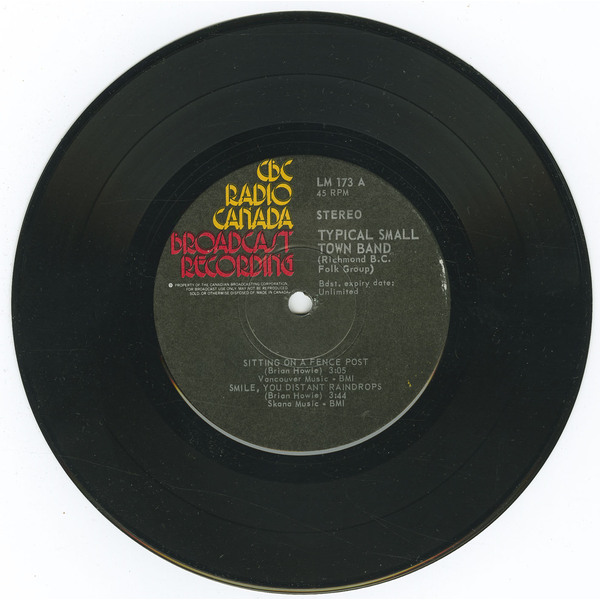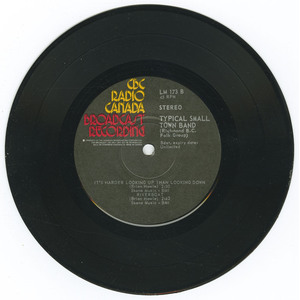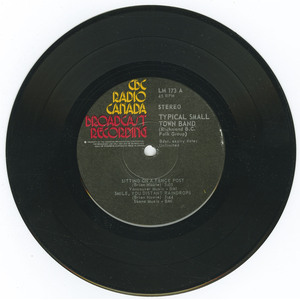Information/Write-up
The story of the Small Town Band begins long before the Richmond years, tracing back to Shilo, Manitoba, where brothers Brian and Bruce Howie first began performing as teenagers. Alongside drummer Rennie “Tiger” Sirianni, they formed an instrumental group called The Saints, developing their skills through school dances, base events, and community shows. Bassist Jerry Crowder, who lived in Ottawa, joined them during summer breaks, and by the end of high school the group had outgrown instrumentals and began integrating vocals and original compositions into their sets.
At the time, Winnipeg lacked professional recording studios, so the young band travelled to Minneapolis to record two singles. With these masters in hand, they relocated to Winnipeg and reintroduced themselves as The Action. Seeking representation, they invited promoter Frank Wiener to listen to the tracks. Although he felt their instrumental-heavy sound wouldn’t connect in Winnipeg, he liked the singles enough to request one for the Shondels. The band declined, choosing instead to go fully independent. They released their Minneapolis singles directly to CKY and CKRC, where they received heavy airplay over three to four months as an unsigned “mystery” Winnipeg band that no one had yet seen live. During that period they honed their show, added more vocals, and made their debut to an audience who already knew their songs. Their unconventional rise and their rivalry with Wiener made The Action unpopular with some local musicians; the Howies remembered the tension in later years, though came to respect Wiener professionally.
After the group’s Winnipeg period, the Howie brothers eventually moved west to Richmond, British Columbia, where a new phase of their musical life took shape. There, toward the end of the 1960s, Brian and Bruce formed Typical Small Town Band with bassist Levern Delves, drummer Peter Jensen, and vocalist Waverly Stevenson. The new group built upon the songwriting discipline the brothers had developed in Manitoba, but moved toward a warmer blend of folk, country, and melodic pop. Unlike many young bands on the local circuit, the Howies focused almost entirely on original material, creating a sound that felt distinct within the burgeoning Vancouver-area music scene.
CBC radio and television soon began featuring the group, and their songs attracted attention from publishers and producers in both Canada and the United States. Interest from TRO in New York and offers from Canadian figures such as the Mercey Brothers and Alberta’s Doug Hutton suggested a promising future. That momentum was interrupted in 1972 when the CBC technicians’ strike forced the cancellation of a key national television appearance in Toronto. The setback deeply affected the group’s morale, and the original five-piece Typical Small Town Band dissolved soon afterward.
Brian and his younger brother Stevan, however, were far from finished. They re-formed as a duo under the simplified name Small Town Band, and almost immediately found success. Their performance on Juliette’s “Talentscope” broadcast from Vancouver led CBC to commission a Broadcast Recording, and in 1973 the duo released the four-song LM 173 disc Richmond B.C. Folk Group. Stevan played acoustic guitar, electric bass, drums, and harmonica, while Brian handled acoustic and electric guitars; both provided lead and backing vocals. The record’s national circulation through CBC radio programmers introduced the Howie brothers to listeners across the country.
In 1974 the duo appeared on another CBC release, contributing “Legend,” “Beyond the Need,” “Working Fever,” and “River Boat” to LM 403. That same year they independently released the Monashee single “Ballad of Bill Miner” backed with “Mountainsong,” a strong western folk narrative influenced by British Columbia history and perfectly suited to their clear, unadorned storytelling style.
The brothers’ work expanded again when they founded Bro Recordings, their own independent label based in Richmond and co-owned by Brian and Bruce Howie. Bro gave them full control over production, and through it they released several singles under variations of the Small Town Band name. In 1974 they issued “Same Old Song” / “The Last Time”, with Brian fronting the sessions and Stevan producing, engineering, and contributing vocals and guitar. Musicians such as Ken Jenkins, Peter Walters, Terry Moffatt, and Joy Lapka appeared on various Bro sessions, but the core always remained the Howie brothers, continuing the collaborative approach they had established in their CBC years.
The final piece in the arc came in 1977, when Brian released the Bro Recordings single “Fence Post” / “Why’s of Loving Her.” Produced by Stevan, the A-side was a more electric, rock-leaning reinterpretation of “Sitting On a Fence Post,” the song they had first recorded for CBC LM 173 four years earlier. Although issued under Brian’s name alone, the record reflected the same sibling partnership that had shaped their work since the late 1960s.
Across the long path from Shilo’s Saints to Winnipeg’s Action, from Richmond’s Typical Small Town Band to the duo years of Small Town Band and the independently run Bro Recordings catalogue, the through-line remained unmistakable: strong original songwriting, acoustic-rooted arrangements, and the steady, quietly determined musical vision of the Howie brothers. Their body of work — seven known singles, two CBC releases, and a long, interconnected history across three provinces — stands as a uniquely Canadian story of perseverance, craft, and independence.
-Robert Williston
Stevan Howie: lead and backing vocals, acoustic guitar, electric bass, drums, harmonica
Brian Howie: lead and backing vocals, acoustic and electric guitars
Written by Brian Howie



No Comments